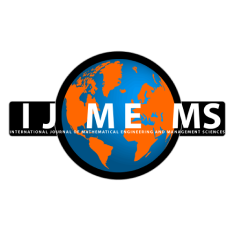Pradip Kumar Sahu
Department of Industrial Design, National Institute of Technology Rourkela, Rourkela-769008, Odisha, India.
Bibhuti Bhusan Biswal
Department of Industrial Design, National Institute of Technology Rourkela, Rourkela-769008, Odisha, India.
DOI https://dx.doi.org/10.33889/IJMEMS.2019.4.5-094
Abstract
In this paper, the geodesic approach has been employed for an effective, optimal, accurate and smooth trajectory planning of a mobile robot manipulator mechanism. Generally, geodesic can be described as the shortest curvature between two loci on a Riemannian manifold. In order to attain the planned end-effector motion, Riemannian metrics has been consigned to the forward kinematics of mobile robot wheel as well as the mobile robot manipulator workspace. The rotational angles of wheel and joint kinematic parameters are chosen as local coordinates of spaces to represent Cartesian trajectories for mobile wheel rotation trajectories and joint trajectories respectively. The geodesic equalities for a given set of boundary conditions are evaluated for the chosen Riemannian metrics and the computational results of the geodesic equations have been shown. So as to verify and validate the efficiency of the chosen geodesic scheme, the method has been implemented for the motion planning and optimization of a mobile robot with a simple 3R manipulator installed upon its platform.
Keywords- Mobile robot, Trajectory planning, Homogeneous transformation, Geodesic method, Motion analysis.
Citation
Sahu, P. K., & Biswal, B. B. (2019). Geodesic Approach for an Efficient Trajectory Planning of Mobile Robot Manipulators. International Journal of Mathematical, Engineering and Management Sciences, 4(5), 1196-1207. https://dx.doi.org/10.33889/IJMEMS.2019.4.5-094.



